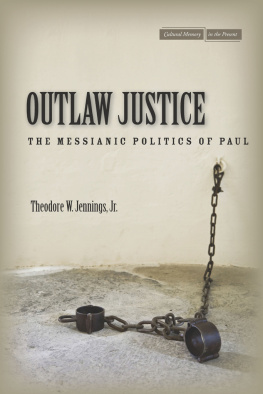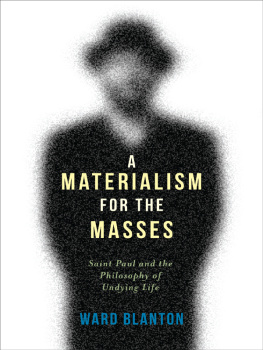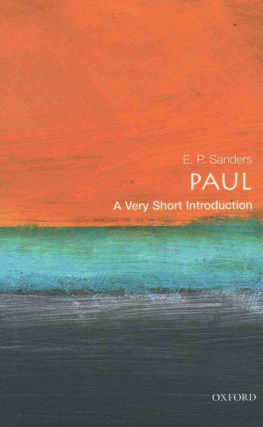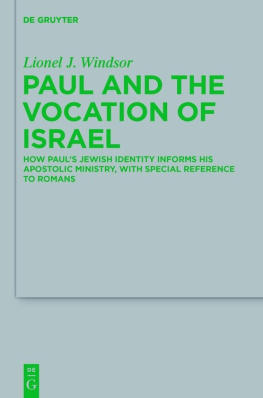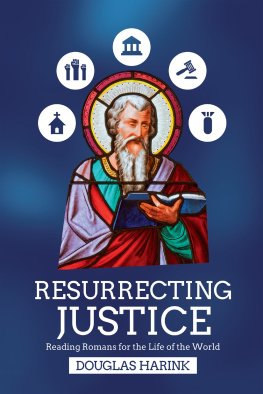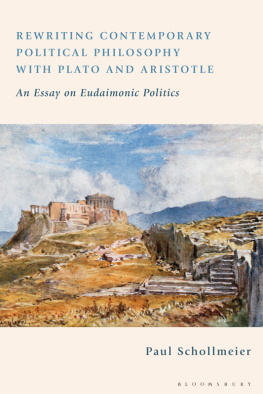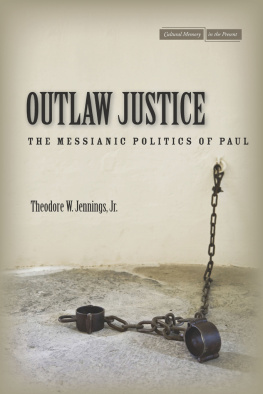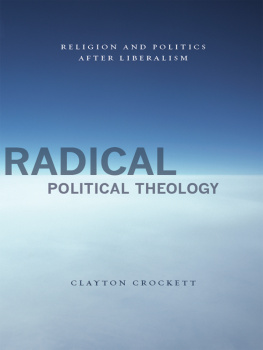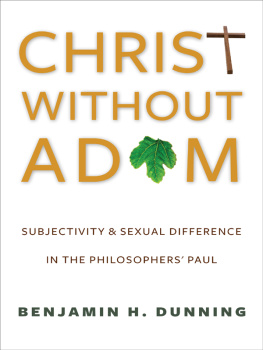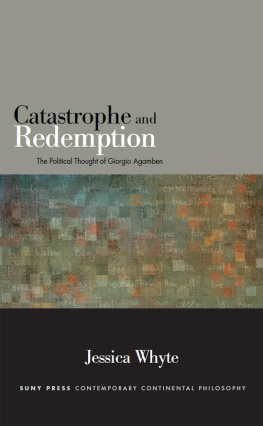C ultural Memory in the Present
Hent de Vries, Editor
OUTLAW JUSTICE
The Messianic Politics of Paul
Theodore W. Jennings, Jr.
STANFORD UNIVERSITY PRESS
STANFORD, CALIFORNIA
Stanford University Press
Stanford, California
2013 by the Board of Trustees of the Leland Stanford Junior University.
All rights reserved.
No part of this book may be reproduced or transmitted in any form or by any means, electronic or mechanical, including photocopying and recording, or in any information storage or retrieval system without the prior written permission of Stanford University Press.
Printed in the United States of America on acid-free, archival-quality paper
Library of Congress Cataloging-in-Publication Data
Jennings, Theodore W., author.
Outlaw justice : the Messianic politics of Paul / Theodore W. Jennings, Jr.
pages cm. (Cultural memory in the present)
Includes bibliographical references and index.
ISBN 978-0-8047-8516-7 (cloth : alk. paper)
ISBN 978-0-8047-8517-4 (pbk. : alk. paper)
1. Bible. N.T. RomansPhilosophy. 2. Paul, the Apostle, SaintPolitical and social views. 3. JusticeBiblical teaching. 4. Justice (Philosophy) I. Title. II. Series: Cultural memory in the present.
BS2665.6.J8J456 2013
227.106dc23
2012033120
ISBN 978-0-8047-8599-0 (electronic)
Contents
Acknowledgments
I was initiated into the complexities and pleasures of reading Paul by Hendrikus Boers, with whom over the course of forty years I had the pleasure of long-night conversations about Paul, and Romans in particular. It was with him that I learned the challenges of a humanistic interpretation of the New Testament (even though our theological perspectives were quite different). The first fruit of that interest was my book Reading Derrida / Thinking Paul: On Justice, which interrupted work on the current project and also reoriented it. The former book was published before Hendriks untimely death.
This book could not have been written without the critical and enthusiastic engagement of many students in seminars on Romans beginning in Mexico in 1984 and continuing for many years at the Chicago Theological Seminary. In addition, students in my seminars that engaged contemporary continental philosophy have made many important contributions. I am as always grateful to them and for them.
I am grateful to Adam Kotsko, who graciously agreed to cast his expert eye over the manuscript, to the anonymous readers for the Press who made several helpful suggestions, and to the editors at Stanford, Emily-Jane Cohen and Hent de Vries, who encouraged the publication of this book. Tim Roberts and the editorial team have made invaluable contributions to the readability of this book.
The book is dedicated to all those I have been privileged to meet in many parts of the world who are engaged in the struggle for a new society, a democracy to come perhaps, in which exclusion and exploitation are ended and all enter into the messianic radiance.
Introduction
GETTING READY TO READ ROMANS
Why another book on Pauls letter to the Romans? Since the early third century, when Origen wrote his extensive commentary, this letter has been the most commented-upon text in the New Testament.
Romans is generally read as an exposition of Christian doctrine or (more recently) as a window into early Christianity. Here I will propose another way of reading the text. I will read it as a text that deals with the most fundamental questions of what might be called political philosophy, that is, a thinking of the political, a thinking of the way in which human life is to be ordered as a corporate or common life. Specifically, I will argue that Paul may be read as developing a messianic politics that stands in contrast to the political order established by Rome and as an alternative to the polity of Moses or of the Judeans. In Pauls day there had already been attempts by Jewish intellectuals to argue for the superiority of Judean or Mosaic political order to the political order of Rome (Stowers 35). Both Judean and Roman polity had in common that they conceived of the political in terms of the basic law that structured common life. In this they were in a certain continuity with the thinking of the political that had characterized the approaches of Plato and Aristotle, who approached the political as a question of providing a legal order that would produce a just arrangement of social life. Thus, Aristotle, after famously affirming that the human being was the political life-form (zon politikon), maintained that justice is the bond of men in states. For the administration of justice, which is the determination of what is just, is the principle of order in political society (Politics 1253a.3739). His teacher, Plato, had offered reflections on an ideal political organization oriented toward justice in texts such as The Republic, The Statesman, and The Laws. Indeed, it appears that Plato attempted to put his ideas into practice in terms of developing a constitution for Syracuse. This attempt was based in part upon the notion that the principal exemplars of political order represented by Cyprus, Sparta, and Athens all had their polity derived from a lawgiver (Solon of Athens, Minos of Crete, Lycurgus of Sparta) who had provided a wise constitution or basic set of laws to govern the common life of the people (Plato, Laws 1.624631). Given this notion of the lawgiver and the attempts of Plato and Aristotle to offer ideal constitutions, it is easy to see how Moses also could be understood as the founder of a sort of political or constitutional order.
At least since the time of Augustine, theologians have known that Paul is concerned in Romans with the themes that were the common currency of political thinking: law and justice. But it is also the case that most readings of Romans have deflected attention away from this political question in order to focus upon the situation of the individual believer in relation to God. This has also meant that the text has been read primarily as a religious rather than a political text. Of course, this dichotomy would probably not have been intelligible to Paul (or to Plato or Caesar Augustus for that matter), but the political and philosophical character of Pauls argument has receded from view. The result is that the text is read as a book of the church that concerns narrowly religious issues. Indeed, in English this process has been exacerbated by the disappearance of justice (and injustice) from the translation of the text. Terms like righteousness, unrighteousness, and wickedness have been substituted to make the political significance of what Paul is up to disappear behind a fog of religiosity.
The reading of this text that I propose here breaks with this tradition of reading Paul. The reading begins by restoring terms like law and justice to their basic political significance. So dominant has the apolitical reading of Romans become that it will be necessary to introduce a number of unfamiliar translations into this reading. In part this is necessary to help the reader encounter a text with fresh eyes not blinkered by the tradition. A strategy of defamiliarizing is almost always necessary to allow a fresh encounter with the text. But in this case it is even more important if the text is to be liberated from its cloying confinement in the cultlike enclave of traditional religious reading. Much of this is simple substitution warranted by the text itself: Judean rather than Jewish, messiah rather than Christ, justice rather than righteousness, fidelity or loyalty rather than faith, generosity or favor rather than grace, Joshua rather than Jesus, and so on. The significance of these changes will become apparent as the reading progresses.
Next page
